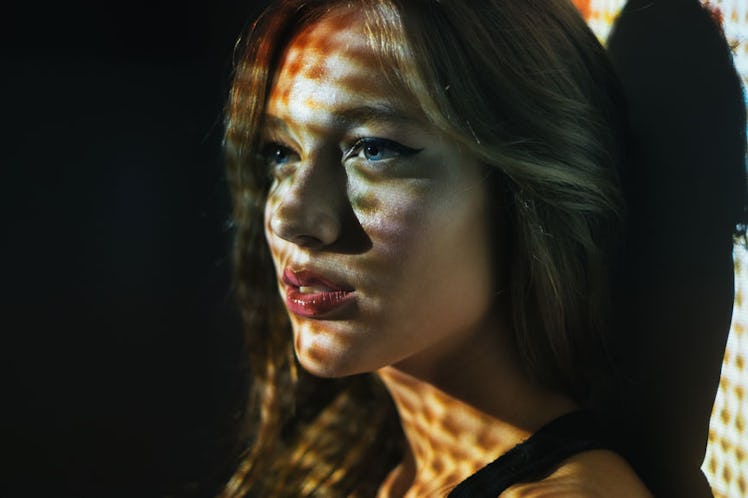
Experts Reveal What Your Fear Of The Dark Really Means, Just In Time For Halloween
Here’s a fun fact you might not know about me: I love getting scared. Horror movies, Stephen King novels, haunted houses, and hayrides: For me, being scared just further proves that I have a pulse, and, IMO at least, it’s one of the best thrills in life. Knowing that, though, you might be surprised to learn that, for years, I couldn’t fall asleep without a night light. Why am I afraid of the dark if I live for being spooked in the daylight, you ask? Well, that’s just it. Darkness casts a shadow over me, and the thing about being scared in settings that are lit up is that you can see for yourself what’s actually going on. Movies are (mostly) fictional, Stephen King’s creepy tellings are just words on a page, and all the haunted attractions at Halloween are staged. The shadows of night, however — those are real, and that is what creeps me TF out.
These days, I’m a little bit less scared of the dark than I used to be, but that’s more or less because, if I hear a thump in the darkness, or worse, my imagination plays tricks on me and I swear I’ve seen something moving in the living room through our bedroom doorway, I can just wake my husband up so he can scope it out while I hide under the covers.
If you’re afraid of the dark, it’s likely because your imagination gets the best of you, but the truth is, Mary Kate and Ashley got it right when they sang about this very topic in their 1998 You’re Invited: Camp Out Party movie, when Ashley thinks she sees some sort of monster creeping outside their tent (judge me for remembering this scene, I dare you): “Things that scare us in the night, just seem funny when it’s light,” she sang. And Robert Glatter, M.D., an assistant professor of emergency medicine at Lenox Hill Hospital, Northwell Health, agrees.
“Simply put, we tend to fear things that we can’t see, and the lack of visual stimuli coupled with the unknown tends to elicit fear in us. It’s part of our hardwiring and neurobiology,” Glatter tells Elite Daily over email. In other words, when you’re surrounding by total darkness, even if your eyes adjust to the shadows, your fear of the dark stems from a combination of the fear of the unknown, and the fear of not being able to see potential dangers right in front of your eyes.
Glatter also points out that being afraid of the dark is actually pretty common, and it can even stem from bad experiences you might have had as a child. “Negative experiences as a child, such as a fall in the dark resulting in injury, or a burglary during childhood may further reinforce fear of the dark,” he explains. “As we age, these negative experiences may remain with us and can be evoked during nighttime or when awakening from sleep in the middle of the night.”
Considering I have the memory of an elephant, everything Glatter’s saying makes total sense. If I think back to when I was a little girl, lying awake in the middle of the night, listening for any unusual sounds and checking for monsters under the bed, the evidence is there: I’ve always been afraid of the dark. It’s really not all that surprising that, at 26 years old, I’m still nervously looking over my shoulder any time I shut the light off.
Are you afraid of the dark, too? At least now you know you aren’t alone, and that this kind of phobia isn’t just something you experience as a kid and necessarily grow out of. In fact, John Mayer, Ph.D., a clinical psychologist and author of the book Family Fit: Find Your Balance in Life, told Glamour that a whopping “11 percent of the United States population is afraid of the dark.” But just because it’s normal to feel a little skittish in the dark, doesn’t mean you shouldn’t at least try to ease your fears.
You don’t have to become BFFs with darkness; you just have to be able to coexist, and according to psychologist Danielle Forshee, LLC, one way of doing so is to invest in a night light. “Research has found that human psychological sensations and perceptions of fear can be affected by varied lighting conditions; hence, increasing lighting in your surroundings is likely to increase a person’s sense of security if they are afraid of the dark,” Forshee tells Elite Daily. In other words, brightening a room with a dim bedside lamp, or even wall plug-in, can help you feel less afraid of the stark darkness you'd otherwise experience without one.
If you'd rather face the darkness head-on, Glatter suggests using the powers of meditation and breathing exercises to desensitize your mind to the darkness and to help yourself fall asleep more easily. "Slow, deep, abdominal breathing slows the respiratory and heart rate, allowing one to feel more calm and rational in facing their fear of the dark," he tells Elite Daily. The end goal is to, ultimately, try your best not to dwell on your fear of the dark by, instead, making peace with the natural progression of light and day. Plus, the sooner you fall asleep, the sooner the sun will rise.